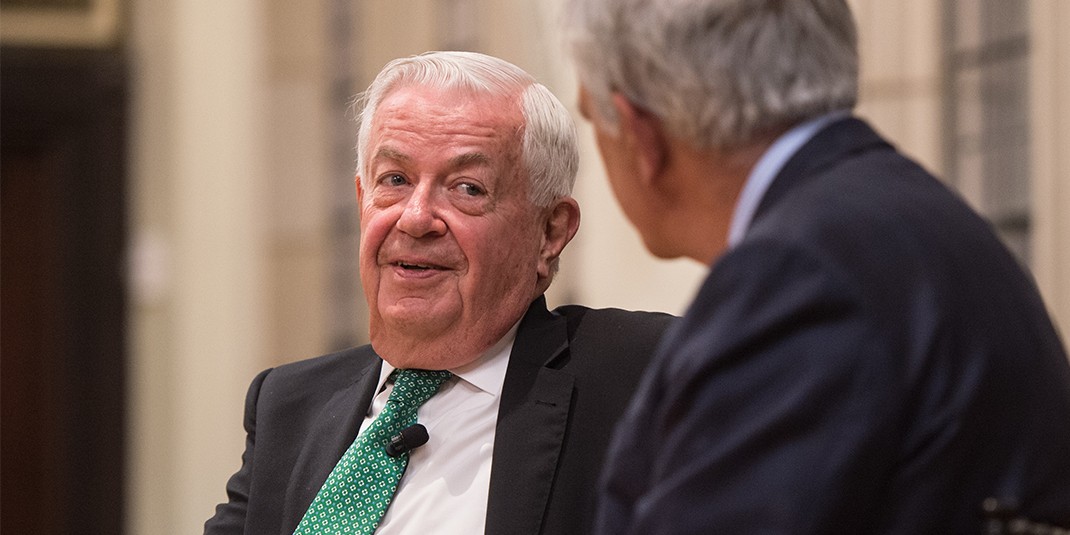Ontario Business Concerns, Leadership, and the Economics of AI – Toronto News

Toronto‘s finest business schools have provided valuable marketplace insight to their communities this week. We’ve outlined some of the high points below.
Ontario Business Bankruptcies Up 39 Per Cent – CBC News
Corporate bankruptcy is on the rise in Ontario. According to Madhu Kalimipalli, Professor of Finance at the Wilfrid Laurier University’s Lazaridis School of Business and Economics, the higher cost of borrowing for corporations could be to blame.
“A lot of these businesses … are the ones who had a tough time servicing their bank loans,” Kalimipalli says in a recent CBC News interview. Kalimipalli posits that the pending NAFTA agreement between Canada, the U.S., and Mexico (CUSMA), as well as the real estate slowdown in the GTA may have also been factors in the corporate bankruptcy rise.
Kalimipalli does not believe the increase in bankruptcies are necessarily cause for alarm. It is possible that the pending U.S. approval of the NAFTA agreement could reverse the bankruptcy trends, as long as government attempts to alter it do not have unintended consequences down the line.
You can learn more about Ontario business bankruptcy here.
Don’t Just Be a Leader, Become a Global Inspiration; Almas Jiwani Delivers a Riveting Keynote Address at Ryerson University – Global Newswire
Almas Jiwani, President of Emeritus UN Women National Committee Canada, recently delivered the keynote speech for the Women in Information Technology Management (WITM) at Ryerson University’s Ted Rogers School of Management at the Emerging Leaders Project (ELP). Jiwani spoke about utilizing technological advances to achieve more “sustainable and inclusive” societies around the globe.
In the speech, Jiwani says:
“We have come a long way with technology, and it has changed our world. It has not only changed the way we work, live, and conduct business, but has also helped create a bridge that connects us to millions across the globe. The age of social media has made it possible for today’s leaders to create a bigger impact, and has empowered them with the ability to reach out to people in different and remote parts of the world and be an inspiration to them to learn, dream bigger, and achieve more.”
Jiwani is also CEO of the Almas Jiwani Foundation, which seeks to “empower women, girls and marginalized communities through focused projects that directly address disparities in equality, education, entrepreneurship and energy rights.”
Learn more about Jiwani’s speech and ELP here.
Joshua Gans Weighs In On Marketing Disruption – Forbes
Forbes recently published a comprehensive interview with Joshua Gans, Chair of Technical Innovation and Entrepreneurship Professor of Strategic Management at University of Toronto’s Rotman School of Management, revisiting some of the themes in his 2016 book The Disruption Dilemma. In particular, Gans speaks about disruption in marketing.
He addresses the future of marketing with advances in AI, saying, “AI can do only a limited range of what we might call cognitive functions,” Gans said, “What it can’t do is exercise judgment and understand what the trade-offs are in decisions.”
According to Gans, exercising judgment in this way is, “an essential part of any creative process.”
Gans is also the Chief Economist at Rotman’s Creative Destruction Lab (CDL), a seed-stage program for tech-based companies. CDL is dedicated to helping innovators grow their ideas and attain the funding necessary to bring their ideas to the marketplace.
You can read more from the full Joshua Gans interview with Forbes‘ Paul Talbot here, and watch Gans’ discuss AI at Rotman below.
Top 5 European MBA Programs for ROI

There’s no denying that European business schools are commanding a growing share of MBA students. According to the latest trends, as MBA applications have dropped in the U.S., they’ve increased. Last year, 61 percent of European business schools reported an increase in application volume.
There are many reasons for this increase, from the changes in U.S. immigration policies to the desire for a more globally focused education. However, one of the most appealing aspects of European business schools has to be cost. American business schools typically require a hefty investment in tuition as well as two years of foregone salary. In Europe, it is far less.
Many schools in Europe receive government funding, allowing it to offer lower tuition. For example, an MBA at IMD in Switzerland costs just CHF 60,000 for its One Year MBA. This low tuition cost and short program length also translates into a powerful return on investment (ROI). Continue reading…
HBS Examines the Allure of White-Collar Crime, and More – Boston News

Welcome back and a happy 2019!
Let’s explore some of the most interesting stories that have emerged from Boston business schools this week.
Interviewing White-Collar Criminals: 6 Tips from Harvard Business School’s Eugene Soltes – Journalist’s Resource
Denise-Marie Ordway from Journalist’s Resource recently profiled HBS professor Eugene Soltes, who’s 2016 book Why They Do It: Inside the Mind of the White-Collar Criminal surveys what “drove dozens of wealthy, successful businessmen to become white-collar criminals.”
Soltes offered six tips for journalists on how to build trust and develop rapports with potential sources behind bars.
- “Don’t lead with personal questions and questions that probe into the meatiest details of a convict’s crimes.”
- “Have a plan for whether and how you’ll use sensitive information that sources might divulge once they trust you.”
- “If you want prisoners to talk to you, write them a letter.”
- “When interviewing individuals who are incarcerated, choose phone calls over in-person meetings. You can develop a rapport more quickly through four 15-minute phone calls than one hour-long, in-person conversation.”
- “Establish a system of checking your biases to limit the impact your relationships with sources could have on your work.”
- “If you’re describing someone’s feelings, opinions or mindset, consider letting that person review what you have written to make sure it represents them accurately.”
You can read more from the Soltes profile on white collar criminals like Bernie Madoff in Journalist’s Resource.
Stocks & Bonds, Eggs & Bacon – Sawyer Business School
In early December, 2018, the first Summa Breakfast at the Sawyer Business School featured Amundi Pioneer Asset Management CIO Ken Taubes, MBA ’84, who offered his insights into “where the global economy has been and where he thinks it is going.”

A look inside the Summa Breakfast, held last month at Sawyer Business School / Photo via suffolk.edu
Taubes was surprisingly optimistic: “The dollar’s been strong, and the economy’s fine. In the macro sense for consumers, it hasn’t been this good in a long time.”
He also advises attendees to “turn off the noise and look for opportunities.”
You can read more about the recent Sawyer event here.
The Billionaire Next Door – Carroll School News
Boston College’s Joseph E. Corcoran Center for Real Estate and Urban Action recently hosted billionaire philanthropist Bill Cummings, a “model real estate developer with a strong conscience,” who spoke to roughly 70 BC community members.
After an overview of Cummings’ inspiring rags-to-riches story, along with a remarkable career ascent, he urged attendees to “do the things you want to do, and do them reasonably well.”

“An entrepreneur won’t find success by getting into a putatively lucrative industry that he’s not passionate about,” Cummings said at a recent BC event. / Photo via bc.edu
Cummings was recently honored as one of the Top 50 Givers by Forbes. The Cummings Foundation, according to the article, has “awarded more than $200 million to nonprofits in the Boston area.”
“The grants have made an impact near and far, from soup kitchens and homeless shelters in Essex, Middlesex, and Suffolk counties, all the way to Rwanda, where the foundation has established medical centers in collaboration with Boston-based nonprofit Partners in Health.”
Cummings closed with a paraphrased quote from dancer and actress Eleanor Powell:
“What we are is God’s gift to us. What we become, and what we do with our lives, is our gift to God.”
You can read more about Cummings here.
Bloomberg, Knight, Stand Out Among World’s Biggest MBA Success Stories

You may (or may not) be surprised to learn that the majority of Forbes‘ Billionaires List features people do not have an MBA. It’s true—Amazon paragon and Washington Post owner Jeff Bezos comes from Princeton, but with degrees in electrical engineering and computer science. Bill Gates is perhaps the most famous college dropout (sorry Kanye). Even the Oracle of Omaha himself, Warren Buffett, only holds a Bachelor’s degree in Business Administration from the University of Nebraska. But that doesn’t mean there aren’t some standout MBA success stories on the list. Continue reading…
The Trump Threat Could Endanger Chinese Student Visas

For Chinese students looking to study in the United States, the trade war could start making things increasingly difficult. In fact, getting a student visa may become virtually impossible soon.
Earlier this year, the Financial Times reported that the Trump administration considered banning all Chinese students from the U.S. According to the newspaper, “Stephen Miller, a White House aide who had been pivotal in developing the administration’s hardline immigration policies, pushed the president and other officials to make it impossible for Chinese citizens to student in the U.S.” However, if that were to happen, the consequences would be devastating.
More than 350,000 Chinese citizens studied at U.S. universities during the 2016-17 academic year. That’s one-third of all international students, which means a ban would have a significant impact on available academic programs and more. For example, at the University of Illinois, University Vice Provost for Undergraduate Education Kevin Pitts warned that the recent decline in Chinese student enrollment could “affect the in-state scholarships it can offer.”
And the results could become even more troubling if a continuing decline in Indian students follows. China and India make up almost half of all international students in the U.S. Without both of those countries, universities may be in serious financial trouble.
Businesses may not get off free from a ban either. A lack of Chinese student visas could mean moving more resources outside the U.S. to stay competitive. According to William R. Kerr, the author of The Gift of Global Talent, “This link between American competitiveness and immigration is a persistent theme for the tech industry … talent in the knowledge economy can go anywhere—excepting, of course, where nations impose limits on people flows.”
Even if a full ban doesn’t go into effect, the U.S. is already feeling the results of the heightened tensions between countries. In June, the Trump administration began enacting new restrictions for Chinese students, which has already decreased student application in 2018 and created uncertainty.

“There’s a lot of fear among Chinese students,” according to Heather Stewart, the Counsel and Director of Immigration Policy at NAFSA: Association of International Educators, in a recent Forbes interview.
“Before the visa policy change, there were concerns about visa denials and slow processing. Now with the one-year visa for certain areas of study, there is further apprehension that the U.S. will lose these talented students to other countries.”
At this point, there’s no way to know how the Trump administration could swing, but things aren’t looking good. There are few remaining Chinese goods on which the U.S. can impose tariffs, which means Chinese student visas could take the next big hit in the trade war.
Read the entire Forbes piece, “What Will Trump Do Next With Chinese Student Visas?”
This article has been edited and republished with permissions from Clear Admit.
DeGroote Introduces New Faculty, and More – Toronto News

This week, Toronto business schools have welcomed new faculty, promoted existing faculty, and been cited in popular publications. We’ve given a brief overview below.
The Innovators: DeGroote Welcomes Teresa Cascioli, Alfredo Tan as Industry Professors – McMaster News
McMaster University’s DeGroote School of Business has added two new professors to strengthen the school’s commitment to nurturing innovation and entrepreneurship. Professors Teresa Cascioli and Alfredo Tan have committed to a three-year term at the school.
Both Cascioli and Tan have joined the Strategic Management faculty. Cascioli will specialize in entrepreneurship, whereas Tan, a former Facebook executive, will specialize in digital transformation.
Cascioli, who graduated from McMaster in 1983, has long been involved with its growth. In 2008, she won the Wayne C. Fox Distinguished Alumni Award. She has donated upwards of $6 million to the school since graduating. Len Waverman, the Dean of the DeGroote School of Business, says:
“Teresa is someone who’s had great success in business, and she’s still succeeding. She’s a noted entrepreneur, and as we’re pushing more into the innovation and entrepreneurship space, it will be great to have her expertise on hand.”
Though Tan’s path to the field of digital innovation was far from straightforward, he has established himself as a valuable force. According to Len Waverman, Tan, “… is on the frontier of digital innovation, and that helps us be on the frontier as well.”
You can find out more about the new professors here.
How Leaders Can Get Better At Using Data to Make Decisions – Forbes
Forbes recently highlighted an article from the fall issues of Rotman Management—the University of Toronto’s Rotman School of Management‘s official magazine—discussing the misconception that increased reliance on data analytics to justify business actions has lead to less biased decision-making.
In the case study, Data Analytics: From Bias to Better Decision—which first appeared in the HBR Guide to Data Analytics Basics for Managers—Megan MacGarvie and Kristina McElheran argue that bias is still a major concern, even when data is informing the decision.
The co-authors laid out a few common cognitive traps that decision-makers often fall into. For example, “The Confirmation Trap” occurs when a decision-maker pays more attention to data that aligns with their expectations or existing beliefs. Understanding these cognitive traps may help organizations execute decisions that are truly informed by data analytics, rather than bias.
You can read more about the research here.
Schulich Professor Peter Macdonald Appointed Co-Director of Hennick Centre – yFile
York University has named Schulich School of Business Professor Peter Macdonald as the Co-Director of the Hennick Centre for Business and Law. After graduating from York’s Osgoode Hall Law School in 1985, York practiced law at multinational corporations, acted as a mediator, and eventually returned to York in 2001 to teach business law at Schulich.
On the announcement, Ed Waitzer, Director of the Hennick Centre for Business and Law, says:
“We’re very fortunate to have Peter join us as a co-director of the Centre. As co-director of the JD/MBA program, Peter already plays a key role in, and has made a huge contribution to, many of our programs and priorities. He’s a terrific resource.”
You can learn more about Professor Macdonald here.
